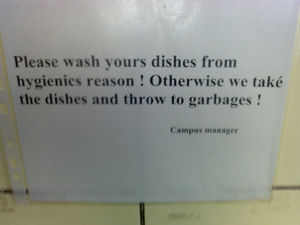- Czenglish
-
An example of Czenglish at the Campus of Charles University in Prague

Czenglish, a portmanteau of the words Czech and English, is a poor or 'broken' English spoken by native Czech speakers. Examples include confusing verbatim translations (such as "basic school" for "základní škola", which should be "primary school" or "elementary school"), incorrect word order in a sentence and use of inappropriate prepositions and conjunctions because of the influence of their Czech equivalents.
Another typical aspect is the absence of definite articles (due to the lack of articles in the Czech language) and using of "some" in place of an indefinite article. In Czenglish as well as Central European accents /θ/ is often pronounced as [s], [t] or [f] and /ð/ as [d], and /r/ is sometimes pronounced as an alveolar trill as in some Scottish accents, rather than the more standard approximant. Voiced consonants at the end of words like "big" are pronounced unvoiced ([bɪk]); final "ng" is pronounced as [nk] or [ŋk].
Similar things also happen in Slovakia. This is due to the similarities of the Czech and Slovak languages.
Contents
Language humour
Some elements of Czenglish only cause a little confusion and are eventually understood by a native speaker. Others, however, may lead to much more embarrassing situations, since for a native English speaker they seem to be correct English sentences, although the Czech speaker meant to say something different. Such misunderstanding may be recognized only by considering the appropriateness of each of the possible meanings in the given context.
Example
- A Czech girl was working in a pub in the UK when the landlord asked her if she could possibly continue to work longer hours. She replied, "Only if you get down on your knees and please me". The confusion here arises from the Czech word prosím, which is most commonly an idiom which translates as "please", but is literally part of the verb prosit meaning "to beg".
Literature
- Sparling, Don (1991). English or Czenglish?: jak se vyhnout čechismům v angličtině. Prague: Státní pedagogické nakladatelství. ISBN 80-04-25329-6.
External links
- Common Czenglish mistakes (based on Starling's book)
- Czenglish – an explanation? (A possible explanation for the lack of proof reading in foreign language menus, advertising etc in the Czech Republic)
Code-switching and interlanguages English Arabic Arablish · Camerounais Cameroonian and Camfranglais · Czech Czenglish · Chinese Chinglish · Danish Danglish · Dutch Dunglish · Finnish Finglish · French Franglais · German Denglisch · Hebrew Hebglish · Hindi Hinglish · Hong Kong · Japanese Engrish · Korean Konglish · Maltese Maltenglish · Malaysian; Manglish · Namibia Namlish · Polish Poglish · Portuguese Porglish/Portuglish · Russian Runglish · Serbian Serblish · Sicilian Siculish · Singaporean; Singlish · Spanish Spanglish · Swedish Swenglish · Tagalog Englog · Tamil Madras Tamil · Telugu Tenglish · Thai Tinglish · Vietnamese Vinish · Visayans Bislish · Yiddish YinglishFrench German Russian DeutschrussischRussian Ukrainian Surzhyk, Balachka · Belarusian Trasyanka · Norwegian Russenorsk · German German-Russian pidginSpanish Categories:
Wikimedia Foundation. 2010.

